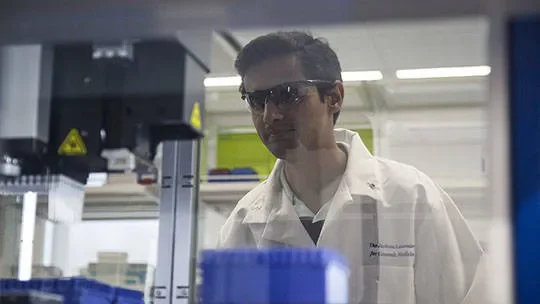Identifying tumors of unknown origin
Article | February 21, 2017
M.D. Anderson Cancer Center and JAX Genomic Medicine begin clinical study using JAX ActionSeq Plus™ to identify additional treatment options for patients with cancers of unknown primary.
The M.D. Anderson Cancer Center (MDACC) is working with The Jackson Laboratory (JAX) to conduct a clinical study of JAX’s new cancer profiling assay,ActionSeq Plus™, in patients with cancers of unknown primary (CUP), where cancer cells are found in the body but the place the cancer began is unknown. Patients eligible for the study will have their tumors’ DNA profile analyzed in the CLIA certified, CAP accredited clinical genomics laboratory at JAX. Then, based on tumor DNA sequencing data and a complex gene curation process, JAX will issue a custom report for each patient that MDACC doctors will use to guide individual patient treatment plans, enabling doctors to consider or select treatments based on the specific genetic alterations identified in the tumor.
Treatment choices are difficult for cancer patients whose diagnosis is made without certainty about where in the body the cancer started.
“Treatment choices are difficult for cancer patients whose diagnosis is made without certainty about where in the body the cancer started,” commentedEdison Liu, MD, Ph.D., president and CEO of The Jackson Laboratory. “JAX is delighted to work with MD Anderson to identify the most promising treatment options for patients with cancers of unknown primary based on their specific tumor’s genomic makeup.”
Treatment options for patients newly diagnosed with common tumors are outlined in guidelines published by professional medical societies like the American Society for Clinical Oncology (ASCO) or the National Comprehensive Cancer Center Network (NCCN), with specific choices determined by the expertise and judgment of the oncologist and guided by the needs of the individual patient. For patients with tumors of unknown origin, data-driven guidance is limited. This study is focused on determining whether the analysis of a tumor’s genetic makeup leads to increased therapeutic options for patients diagnosed with cancer of unknown primary, including both FDA-approved regimens and clinical trials of targeted therapies in development.
The JAX ActionSeq Plus™ test is a targeted panel designed to evaluate 212 cancer-related genes for mutations, and to detect fusions involving one or more of 53 genes known to be associated with various carcinomas, sarcomas and hematologic malignancies. Using next-generation sequencing, the panel assesses all identified functional variants for clinical relevance, based on associations with response or resistance to FDA-approved targeted therapies described in the biomedical literature. The gene targets are selected for their known association with cancer types in over 20 different cancer primary sites.
Evidence of association between genomic variants and potential response to therapy or availability of clinical trials is curated from the peer-reviewed literature, publicly available databases, and The Jackson Laboratory Clinical Knowledgebase. Test results of potentially clinically actionable variants are included in a clinical report, along with associations of these variants with approved drugs and drugs in clinical trials, and links to the referenced biomedical literature.
For more information about the JAX Clinical Laboratory, please visit us athttps://www.jax.org/clinical-genomics.
About The Jackson Laboratory
The Jackson Laboratory is an independent, nonprofit biomedical research institution based in Bar Harbor, Maine, with a National Cancer Institute-designated Cancer Center, a facility in Sacramento, Calif., and a genomic medicine institute in Farmington, Conn. It employs 1,800 staff, and its mission is to discover precise genomic solutions for disease and empower the global biomedical community in the shared quest to improve human health.

